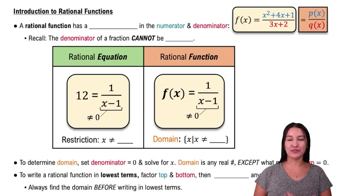Here are the essential concepts you must grasp in order to answer the question correctly.
Domain of a Function
The domain of a function refers to the set of all possible input values (x-values) for which the function is defined. For rational functions, the domain is typically restricted by values that would make the denominator zero, as division by zero is undefined. Understanding the domain is crucial for determining where the function can be evaluated.
Recommended video:
Domain Restrictions of Composed Functions
Rational Functions
A rational function is a function that can be expressed as the ratio of two polynomials. In the given function f(x) = 1/(x^2+1) - 1/(x^2-1), the terms involve polynomials in the denominator. Analyzing rational functions requires identifying points where the denominator equals zero, as these points indicate restrictions in the domain.
Recommended video:
Intro to Rational Functions
Finding Restrictions in the Domain
To find the domain of a function, one must identify any values of x that cause the denominator to equal zero. For the function f(x), we set the denominators x^2 + 1 and x^2 - 1 to zero and solve for x. The solutions will indicate the values that must be excluded from the domain, allowing us to define the valid input values for the function.
Recommended video:
Domain Restrictions of Composed Functions
 Verified Solution
Verified Solution



 4:56m
4:56m
